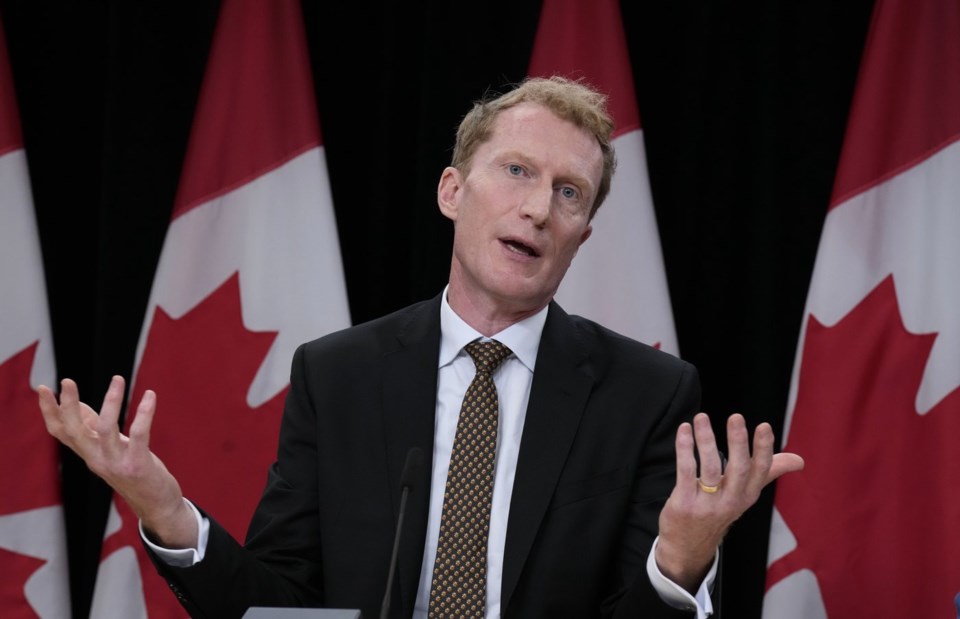TORONTO — As Ottawa moves to include graduate students in its cap on international study permits, experts and advocates alike are raising questions about the need for the move, and suggesting it could prompt top talent to look elsewhere.
Students joining master's, doctoral and postdoctoral programs were previously exempt from the overall cap on international students that Immigration Minister Marc Miller announced in January.
But they are now included in a further reduction of student visas he announced this week, alongside other measures that seek to add stability to a ballooning population of temporary residents.
Ian Wereley, executive director of the Canadian Association for Graduate Studies, said the news landed without warning or consultation.
"All those I spoke to felt surprised or even blindsided by the announcement," he said in an email, describing the sector as "already in a state of crisis."
It's a move that inflicts "significant damage" on Canada's reputation as an international education destination, he said.
Miller acknowledged in his announcement, speaking in French, that the kinds of students coming to Canada to pursue master's degrees and PhDs are "better prepared" to succeed in Canada, and that they respond well to the needs of the Canadian job market.
That's why 12 per cent of international student visas will be reserved for graduate students, he said. His office later clarified that's in line with their historical share of the student population.
Numbers shared by U15 Canada, an association of 15 public research universities, suggest current levels of graduate students are already below the new cap — and that this group has not been significantly contributing to the bloated numbers of temporary residents Ottawa is trying to address.
The association's internal calculations found that there would still have been room for thousands more students last year and an even bigger number this year if the cap had been in place. Immigration, Refugees and Citizenship Canada did not immediately respond to a request for the latest figures.
Chad Gaffield, CEO of the U15 group, said graduate programs competing for the world's best and brightest were not really the problem when it came to mismanagement in the world of foreign student immigration.
"I heard no justification," he said, for why graduate students should be part of the cap, which research has already shown is causing fewer students to apply to study in Canada.
Asked for a rationale, Miller's office said the idea is to prevent bad actors from finding ways to get around the rules.
"What we didn't want is institutions creating fake graduate programs just to find a loophole," said spokeswoman Aissa Diop.
For Gaffield, there's a risk that research universities — and by extension, sectors that need professionals with highly specialized education — will end up as "collateral damage" in the government's effort to reduce numbers and target fraud.
The world's most talented scholars are usually juggling multiple offers, often from multiple countries, he said, making it a "very, very competitive environment."
While Canada has built up a reputation over decades for welcoming them with open arms, he suggested that's changing: "The headline is going to be, and has been, that Canada is not as welcoming as we have been traditionally."
Steve Orsini, president and CEO of the Council of Ontario Universities, said the cap creates "further complexity to the application process" and could dissuade highly skilled students from choosing Canada.
"This could impact advanced degrees in fields such as engineering, health care, life sciences, AI and more."
Some of those specialized programs already rely heavily on international student admissions, said Fahim Quadir, graduate studies dean at Queen's University.
Even if the total number of current graduate students doesn't seem to exceed the cap, the distribution of permits could mean that such programs suffer significantly, he said in an email.
"STEM (science, technology, engineering and mathematics) programs, in particular, could face an existential crisis," he wrote.
"Many programs, I tend to think, would struggle to survive, and some could face a completely uncertain future."
André Côté, director of policy and research at The Dais, a think tank within Toronto Metropolitan University, said the broader policy goal of moving towards sustainable numbers is appropriate.
But even if this week's announcement discourages just a few high achievers, he said, that's enough to have a negative effect.
In addition to the cap, Ottawa is tightening restrictions on spousal work permits for some students. Starting later this year, spouses of master's degree students will only be eligible to work in Canada if their partner's program is at least 16 months in duration.
Immigration lawyer Barbara Jo Caruso agreed that spousal restrictions can be major deterrents for graduate students, especially since there is already a huge price tag on their programs.
Caruso, who is the founding partner of Corporate Immigration Law Firm in Toronto, said she isn't surprised to see the government trying to move towards more stability in the overall system.
But she was skeptical that the graduate student population is even a "drop in the bucket" of the problem Ottawa is trying to tackle.
"It seems to me that they're doing things to look like they're doing things," she said. "I can't really imagine that, now, including the graduates in this cap is really going to make that big of a difference."
This report by The Canadian Press was first published Sept. 20, 2024.
Marie-Danielle Smith, The Canadian Press




